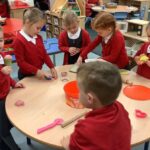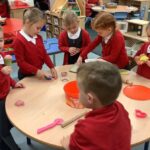Children’s personal, social and emotional development (PSED) is crucial for children to lead healthy and happy lives, and is fundamental to their cognitive development. Underpinning their personal development are the important attachments that shape their social world. Strong, warm and supportive 9 relationships with adults enable children to learn how to understand their own feelings and those of others. Children should be supported to manage emotions, develop a positive sense of self, set themselves simple goals, have confidence in their own abilities, to persist and wait for what they want and direct attention as necessary. Through adult modelling and guidance, they will learn how to look after their bodies, including healthy eating, and manage personal needs independently. Through supported interaction with other children, they learn how to make good friendships, co-operate and resolve conflicts peaceably. These attributes will provide a secure platform from which children can achieve at school and in later life.
- Home
- Our School
- Key Info
- Curriculum
- Parents
- Pupils
- Our Classes
- SEND
- Introduction to SEN Information Report
- Our SEN Provision
- The kinds of SEN that are provided for:
- Our approach to teaching children & young people with SEND
- How we adapt the curriculum and learning environment for children & young people with SEN
- How we identify, assess and review children with special educational needs
- How children with SEN engage in all activities?
- How we evaluate the effectiveness of SEN Provision
- Support for Emotional & Social Development
- Looked After Children with SEND
- SEN Transition
- SEN Specialist Expertise
- Consulting with our SEN Pupils, Parents & Carers
- Compliments, Complaints & Feedback
- Key Policies
- Disability & Accessibility
- SEND Hub – School News and Support
- Contact
- News





